

The main drivers of change are the demand for food, water, and natural resources, causing severe biodiversity loss and leading to changes in ecosystem services. These drivers are either steady, showing no evidence of declining over time, or are increasing in intensity. The current high rates of ecosystem damage and extinction can be slowed by efforts to protect the integrity of living systems (the biosphere), enhancing habitat, and improving connectivity between ecosystems while maintaining the high agricultural productivity that humanity needs. Further research is underway to improve the availability of reliable data for use as the 'control variables' for this boundary.
.
67% Decline of Animals in 50 Yrs. Orangutans Extinct. Chocolate Disappears with Cacao Extinction. Innovative Genomics Institute / University of California at Berkeley Cacao plants are under threat of devastation thanks to warmer temperatures and dryer weather conditions.
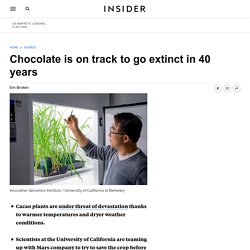
Scientists at the University of California are teaming up with Mars company to try to save the crop before it's too late. They're exploring the possibility of using the gene-editing technology CRISPR to make crops that can survive the new challenges. Beyond the glittery glass-and-sandstone walls of the University of California’s new biosciences building, rows of tiny green cacao seedlings in refrigerated greenhouses await judgment day. Under the watchful eye of Myeong-Je Cho, the director of plant genomics at an institute that's working with food and candy company Mars, the plants will be transformed. It's all thanks to a new technology called CRISPR, which allows for tiny, precise tweaks to DNA that were never possible before. Cacao plants occupy a precarious position on the globe. REUTERS/Dado Ruvic. Majority of Primate Species Vanishing. Conservation International/photo by Russell A.
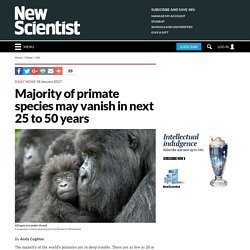
Mittermeier By Andy Coghlan The majority of the world’s primates are in deep trouble. There are as few as 20 or 30 Hainan gibbons left in China, and the trapdoor of extinction is gaping for the Javan slow loris. Even numbers of Madagascar’s iconic ring-tailed lemur have slumped to around 2000. These could be the next primates to disappear from our planet. Seafood Gone. No Exploitable Fish Stocks Left in Asia-Pacific. Biodiversity -- the essential variety of life forms on Earth -- continues to decline in every region of the world, significantly reducing nature's capacity to contribute to people's well-being.
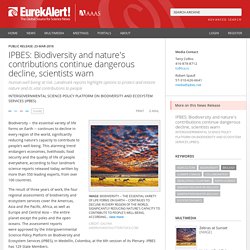
This alarming trend endangers economies, livelihoods, food security and the quality of life of people everywhere, according to four landmark science reports released today, written by more than 550 leading experts, from over 100 countries. The result of three years of work, the four regional assessments of biodiversity and ecosystem services cover the Americas, Asia and the Pacific, Africa, as well as Europe and Central Asia -- the entire planet except the poles and the open oceans.
The assessment reports were approved by the Intergovernmental Science-Policy Platform on Biodiversity and Ecosystem Services (IPBES), in Medellín, Colombia, at the 6th session of its Plenary. IPBES has 129 State Members. Africa Loses 50% of Birds & Mammals Over Past 30 Years. The world must thrash out a new deal for nature in the next two years or humanity could be the first species to document our own extinction, warns the United Nation’s biodiversity chief.
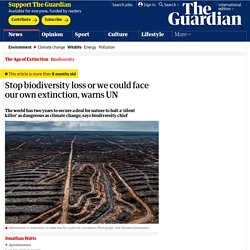
Ahead of a key international conference to discuss the collapse of ecosystems, Cristiana Pașca Palmer said people in all countries need to put pressure on their governments to draw up ambitious global targets by 2020 to protect the insects, birds, plants and mammals that are vital for global food production, clean water and carbon sequestration. “The loss of biodiversity is a silent killer,” she told the Guardian. “It’s different from climate change, where people feel the impact in everyday life. With biodiversity, it is not so clear but by the time you feel what is happening, it may be too late.”
Palm Oil Production Doubles (≈240m tonnes) Orca Populations Experiencing Collapse. 1st October 2018 Killer whale populations at risk of collapse by mid-century.

More Plastic Than Fish in the Sea. As a record-breaking sailor, Dame Ellen MacArthur has seen more of the world’s oceans than almost anyone else.
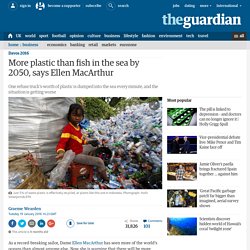
Now she is warning that there will be more waste plastic in the sea than fish by 2050, unless the industry cleans up its act. According to a new Ellen MacArthur Foundation report launched at the World Economic Forum on Tuesday, new plastics will consume 20% of all oil production within 35 years, up from an estimated 5% today. Plastics production has increased twentyfold since 1964, reaching 311m tonnes in 2014, the report says. It is expected to double again in the next 20 years and almost quadruple by 2050. Despite the growing demand, just 5% of plastics are recycled effectively, while 40% end up in landfill and a third in fragile ecosystems such as the world’s oceans.
30% of Animal Species Lost from World’s Ecosystems. Global Mass Extinction Begins. Domestic Cow Now the Largest Land Mammal.